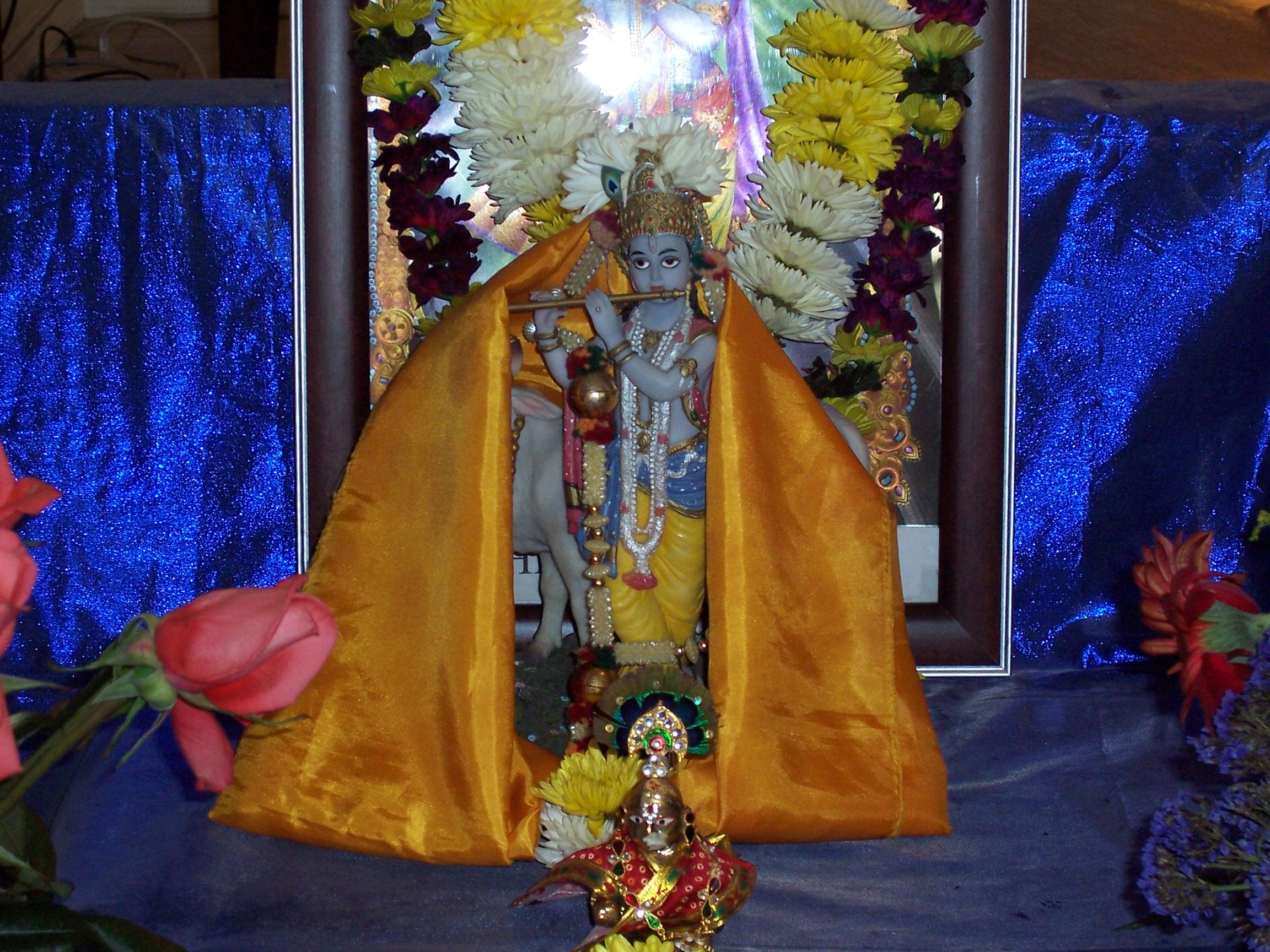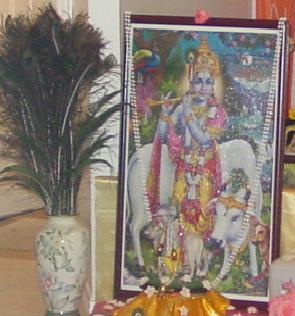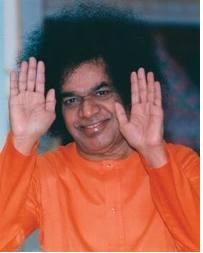 Lord Krishna, the full incarnation of God on earth, led an impeccable life. His divine deeds were ever-mysterious and yet fully saturated with the fullest power of God. Only the highest of saints could catch small glimpses of His Divinity, that too with His grace alone. A vast majority of the people in those days could not recognize Krishna for who He was.
Lord Krishna, the full incarnation of God on earth, led an impeccable life. His divine deeds were ever-mysterious and yet fully saturated with the fullest power of God. Only the highest of saints could catch small glimpses of His Divinity, that too with His grace alone. A vast majority of the people in those days could not recognize Krishna for who He was.
During His avataric career, He taught many lessons to mankind. Most of His teachings were through His own actions. While His teachings are as infinite and innumerable as His names and forms, we are biased toward the following teachings (listed in random order), which we humbly find applicable to our modern lives.
#1. Kartavya Parayana (He diligently performed His duties)
 People think that the Lord had everything at His beck and call and His life must be one of opulence and luxury. In fact, if you look at His life, it was full of untold difficulties. His birth was in a jail and no sooner was He born, He was whisked away to an adjoining village in the middle of the night and in the midst of torrential rains.
People think that the Lord had everything at His beck and call and His life must be one of opulence and luxury. In fact, if you look at His life, it was full of untold difficulties. His birth was in a jail and no sooner was He born, He was whisked away to an adjoining village in the middle of the night and in the midst of torrential rains.
Difficulties were His constant companion. Yet, Krishna would diligently perform all His duties without the slightest neglect. As a king, He took care of His subjects’ needs with extreme diligence. Though an incarnation, as a son, He got His parents released from jail and provided for all their basic necessities.
One notable fact about Lord Krishna was that He could assume multiple forms simultaneously. Once, all the gopikas wanted to be with the Lord at the same time. Using His infinite potencies, Krishna multiple Himself into many forms and graced all His eager devotees at the same time.
He would be administering justice in the royal court at one time and at the same time, He would be caring for His many consorts and their children. Yet, at the same time, He would appear to countless devotees and offer them solace, benediction, and protection.
The truth is that no matter how many difficulties came His way, Krishna did not swerve from His duties, even slightly. He performed all His duties with utmost diligence.
Lesson #1: We must perform our daily duties in life with utmost dedication and devotion, all while offering the results of our actions to God Himself.
#2. Keshava was generous beyond measure
Once, Sudama, a childhood friend of Krishna, offered a handful of rice to the Lord. This Sudama was so impoverished, He did not even have money to buy this gift. In fact, his wife had to beg for this gift as well. Yet, Krishna received this gift with the greatest joy, almost as if it was the universe’s most precious treasure.
In return, the Lord gave Sudama immeasurable wealth. As soon as Sudama reached home from his visit, his house had miraculously transformed into gold and there were precious stones, gold coins, and various other forms of wealth freely flowing into his house.
Lesson #2: We should be generous in our daily lives. We come empty-handed and leave in the same manner. Our hearts should be as magnanimous as humanly possible.
# 3. He practiced supreme equanimity in all conditions
Kanhaiya was born in a small village with hardly any amenities. During His very childhood, He moved to Mathura and was offered princely luxuries. Yet, Krishna maintained His equanimity in both the states and did not get afflicted by either joy or sorrow.
Supreme equanimity was His true ornament.
Lesson 3: Life brings both joys and sorrows. Neither is permanent. Practice even-mindedness during both conditions.
#4. He did not differentiate between other beings
At Gokula, Krishna was in the constant company of cowherd folks and the gopikas. While at Mathura, learned men like Uddhava and Akrura were His companions. Krishna did not ever differentiate between the rich and poor. He treated all alike and was loving toward everyone.
In fact, Lord Krishna’s love was so powerful and enamoring that even animals (such as cows), birds, and all beings across the universe would lovingly respond to His call. The call of His flute was irresistible and all beings would be drawn to His magnetic love.
 Lesson 4: Love all beings! Baba’s teaching “Love All, Serve All” was amply demonstrated by Krishna as well. When you love unconditionally, you will receive love in return. This is the law of nature.
Lesson 4: Love all beings! Baba’s teaching “Love All, Serve All” was amply demonstrated by Krishna as well. When you love unconditionally, you will receive love in return. This is the law of nature.
#5. He remained a true friend, a true lover, a true Lord, and a truly Divine teacher all the way to the end
Krishna accepted Arjuna as His friend, Radha as His loving self, and Arjuna and Uddhava as fellow-pupils. As a friend, Krishna protected Arjuna during his entire life. Had it not been for Krishna, Arjuna could have never won the Mahabharata war.
Krishna was Mother Radha’s devotional goal. Her love was so powerful, Krishna would melt in her mere presence and would often showcase His oneness with Her. Is there a difference between Purusha (Supreme Being) and Prakriti (Mother Nature)? They are both one and the same.
After Krishna moved to Mathura, He continued playing the flute. Despite the distance, His divine tune would give solace to the pining heart of Mother Radha. When Mother Radha gave up her form and merged into God, Krishna stopped playing His flute. Such was their bond — the bond between a true devotee and God. When devotion is true, there is no difference — God and devotee become one.
As a Jagadguru (World Teacher), Madhava continued imparting immortal teachings till the very end. Even before taking Samadhi, He spoke about the cosmic knowledge to Uddhava and directed Him to his divine teacher.
Lesson 5. Fulfill your kinship till the very end. As Baba says, we meet each other on earth due to rinanubandhan (ties from previous birth). Fulfill the duties called for by these ties ungrudgingly, and till the very end.
6. He identified Himself with the universe and all beings
The Divine Krishna considered the universe (and all the beings) as a part of Himself. Never did He differentiate between the two.
Once, Duryodhana sent the Divine Sage Durvasa, who was known for his choleric temper, to his Pandava brothers. The Pandavas were in exile and did not have the resources to feed the army of disciples who were accompanying the sage. Krishna had given the Pandavas a divine pot (Akshayapatra) that would provide food and other necessities to the brothers and their wife, Draupadi. Yet, there was a condition. Once Draupadi would have her meals, the pot would cease providing materials for that day.
When Durvasa arrived at the Pandavas’ dwelling in the forest, Draupadi had just finished her meals. They were helplessly anxious as to how they could feed the entire retinue that was accompanying the sage. As they fervently prayed to Krishna, He appeared on the scene to protect them. There was but one grain remaining in the pot. Krishna ate this grain and felt satisfied.
No sooner did Krishna feel satisfied, all beings in the universe (who are but a part of Krishna) felt extremely satiated as well. The sage and his disciples, too, felt very full and fearing that they would be overfed after this feeling of satiety, fled from the place. In this way, Krishna saved them and also proved His identity with all beings.
Lesson 6. We, too, are one with everyone. There is no difference between us and others (at the atmic level). Feel others’ pain and do the best you can to alleviate everyone’s suffering.
7. He lived only for the sake of service to other beings
Nothing in His life was selfish. All that he did was for the benefit of other beings. From start to finish, his life was one of selfless service. At times, He helped His village folk, while at other times, He kept demonic forces in check. He was constantly helping His devotees and did everything possible to help every being in the universe.
In fact, we have a lot to be thankful for. Had it not been for this incarnation, evil forces with various potent weapons (available with the mere power of thought) would still be extant on earth.
Lesson 7. Always live a life of service. There are plenty of opportunities to serve beings around us. No act is too small, no task is too menial. We don’t have to build big hospitals. Small acts of loving service count just as much as big tasks. It is the intention that counts.
8. He always protected His devotees
At the end of the Mahabharata War, Ashwatthama, a guru-brother and warrior from the Kaurava army, decided to vanquish the very last seed in the Pandava line. For this reason, He dispatched the infallible and nuclear-like Bhramasthra weapon in the direction of Uttara’s womb. Uttara was the wife of the fallen hero Abhimanyu and was expecting a child from their marriage.
Lord Krishna was disgusted by the animalistic behavior of Ashwatthama. It was unbecoming of a mighty warrior to dispatch such a potent weapon in the direction of a helpless fetus who was not even born in this world. Apparently, there was no antidote to this weapon and the recipient would face sure death. But that was not to be the case.
Krishna used His supernatural powers to enter the womb of Uttara in a microscopic form. As the weapon attempted to penetrate the womb, the Lord Himself neutralized the effect of the weapon and saved both the mother and the child.
Lesson #8. Do your best to protect all around you, especially when it is in your power to do so.
9. Krishna was always smiling, forever immersed in bliss
From the Lord’s very birth, the wicked king Kamsa would send evil emissaries to harm Baby Krishna. From monstrous birds and reptiles to ginormous rakshasas (demonic beings endowed with great powers) — all would attack the infant Lord. Yet, Krishna would smile and vanquish them in a trice. In fact, this hostility was a constant throughout the Lord’s life. Despite all the tirade, Krishna was forever smiling and in perpetual bliss.
Can we compare our difficulties to His? Nay! Yet, why do we worry?
Lesson 9. Always smile in life. This one is so simple, you can start at this very second.
10. He never identified with the body
Even in the battlefield of Mahabharata, the mother of all battles, Krishna was always smiling. There was not a trace of adverse emotion (fear, anger, and the like).
Krishna identified Himself with not the body, but His eternal paratmaswaroopam (formless divinity). It is for this reason that He was ever-smiling.
Lesson 10. Never identify yourself with the body. The body is but a mere vessel encasing your real self.
11. Selfless unconditional love was His very nature
Baba has described Krishna as Premavatara (divine embodiment of love). He loved all beings from the bottom of His earth. He even gave liberation to those who offended Him. Although, He put forth a drama on the earthly plane, on the spiritual plane he gave mukti (freedom from birth and death) to his devotees and benefited them very kindly.
Lesson 11. Practice unconditional love, no matter what others do to you. Forgive your enemies and move forward with life. In the material world, we may call ourselves friends, enemies, or relatives, but in the spiritual realm we are all one: Love and Light!
12. He knew all about time, but He lived one day at a time
Kanha was omniscient and had full knowledge of past, present, and the future. He knew fully well what was to come and yet He lived one day at a time — never thinking about the past, nor worrying about the future.
Lesson 12. Live in the present. As Baba says “Past is history; future is mystery.”
13. The Lord considered the Divine Name to be very dear
Once, there was a challenge wherein Lord Krishna was to be put on a scale and an amount of wealth equal to His weight was to be given away in charity. Mother Rukmini put forward all the wealth in the kin gdom but the scale did not tilt even by a small amount.
gdom but the scale did not tilt even by a small amount.
Finally, on Narada’s advice one Tulsi leaf with the name of Lord Krishna inscribed on it was put on the other scale (minus all the material wealth). As soon as this was done, the scale balanced evenly with the Lord’s weight.
Lesson 13. The Lord’s name equals the Lord. The Divine Name is not an ordinary word. It encompasses all the divine potencies of the Lord Himself. Always chant the Divine Name. Even God cannot defeat a devotee who chants His name.
14. He never lost an opportunity to help others transform
When Gopala asked the village folk to stop praying to Lord Indra and offer worship to Govardhana Mountain (which afforded them with life’s daily necessities), Indra was offended and sent forth a torrent of rain and floods to Gokula village. The innocent village folk ran to Lord Krishna, who was their only succor in this hour of need.
Krishna had His own plans. He wanted to humble the king of deities, Indra. With just a tiny tip of his last finger, Krishna raised the entire mountain and held it uplifted for several days and nights. The villagers rushed under the mountain and were untouched by the rain or floods. Such was the power of Krishna.
Seeing this miracle, Indra rushed to the site and fell at Krishna’s feet. He was completely transformed.
Lesson 14. Share your knowledge about God with others. Don’t force them, but do your best to help them transform.
15. Humility incarnate
Although the Lord of the entire creation, Krishna was most humble. He always respected His parents, guru, and elders, and was always anxious to please them. All deities, powers, and beings in the universe were eager to serve the Lord, but He always carried on His daily work on His own, without anyone’s assistance. Much to the contrary, he made attempts to assist others.
Lesson 15. Trees bearing heavy fruits, bend down. Even if you have accomplished great things, always remain humble and serve your fellow-beings with utmost humility.
(c) Om Sai Mandir. All Rights Reserved.



Thank you vey much sir,
For posting the valuable info about lord krishna and I find very much inspiring and overwhelmed to read all the lessons. we appreciate the work and we’ll be waiting for much more info to read and understand.
thanks a lot.
Ravindra